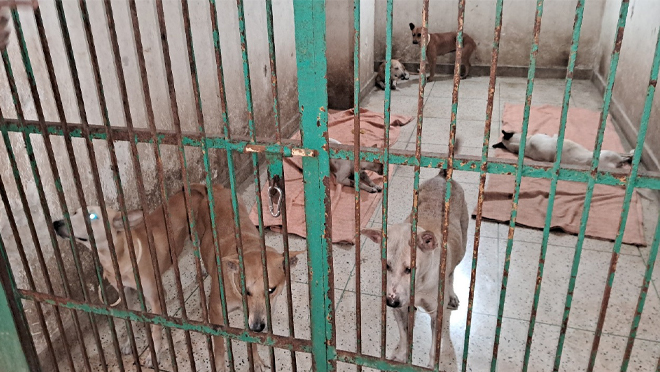Silent suffering: Animal cruelty continues to rise while cases drag on
Silent suffering: Animal cruelty continues to rise while cases drag on

Activists warn that as long as animal cruelty remains a bailable and non-cognisable offence, animals will continue to be the silent victims of unchecked violence.
In a country where the law promises justice, compassion for the defenceless often remains absent.
One February afternoon in Dhaka’s Mohammadpur, CCTV footage captured a scene that would haunt anyone who saw it: a man kicking a small, defenceless cat across the floor “like a football”.
The animal collapsed repeatedly, twisting in pain, but the attacker did not relent. He stomped on the cat with deliberate force, ensuring the poor animal’s death. Neighbours looked on from behind curtains, frozen in horror, many unsure how to intervene or even that filing a complaint was an option. Silence became the sole witness to cruelty.”We have seen about 10 animal-cruelty cases filed nationwide. Only three ended in convictions, two with fines and one with a six-month prison sentence, along with a fine. That is a mere drop in an ocean of suffering, leaving countless animals exposed to unimaginable torment,” said Rakibul Haque, founder and chairman of People for Animal Welfare (PAW) Foundation.
Activists warn that as long as cruelty remains a bailable and non-cognisable offence, and legal proceedings are delayed, animals will continue to be the silent victims of unchecked violence.
Legal loopholes and delays
The 2019 Animal Welfare Act, modeled after the colonial-era 1920 Cruelty to Animals Act, remains weak in enforcement; most provisions are classified as non-cognisable and police are often reluctant to register cases.
“Some sections should allow direct prosecution. Without that, offenders will continue to act with impunity,” Emil explained. He also called for clearer definitions of offences and balanced sentencing, warning that overly harsh penalties might risk misuse.
Earlier on 5 January 2025, 10 dogs and a cat were poisoned at Japan Garden City Housing in Mohammadpur. Six residents, including the housing society’s president, Abdus Salam, and secretary, Shah Noor, were charged.
The case was filed by Rakibul Haque on behalf of four animal welfare organisations. The court recorded the plaintiff’s statement and instructed the Police Bureau of Investigation (PBI) to conduct a detailed inquiry.
“The planning behind this act was deliberate,” Emil said. “According to the complaint, the society president and secretary orchestrated the poisoning, and the other accused executed it by mixing poison into the animals’ food at night. The dogs and cat writhed, vomited blood, and died in extreme pain.”
The court is now waiting for the investigation report to be submitted. Initially, 14 August was set to be the deadline; however, the investigating officer failed to submit the report, which is why the case has now been rescheduled to 29 September.
PBI Sub-Inspector Ershad Ali, the officer handling the investigation, told TBS, “The investigation process has advanced significantly, and we are compiling the report. We hope to submit it to the court very soon.”
The other case of kicking a cat to death in Mohammadpur is also under prosecution. On 14 July, the court framed charges against the accused, and the trial officially began under the court of Metropolitan Magistrate Md Mahbubur Rahman. Testimony is now scheduled for 25 November.
Additional Public Prosecutor Shamsuddoha Sumon told The Business Standard, “The state is taking these cases seriously. As soon as the investigation report is submitted, the court frames charges, and the trial begins. Witnesses present for every scheduled hearing can help expedite justice. We hope the innocent, voiceless animals finally receive due protection under the law.”
Lawyer Zakir Hossain, representing plaintiffs in both the Mohammadpur cases, spoke at length, “Delays in investigation and prosecution embolden offenders. Every postponed hearing, every unsubmitted report, sends a message that cruelty is tolerated.
“When humans see injustice, they protest, file cases, shout, but animals can do none of that. They endure suffering silently. It is our moral and legal responsibility to ensure their protection,” he added.
Ignorance breeds cruelty
Yet the problem runs far deeper than laws or enforcement. It haunts the very fabric of society, where compassion is often absent and the lives of the helpless are treated as disposable. Each act of cruelty is a silent witness to this moral void.
“Without kindness, no law can stop cruelty,” said Emil.
Activists emphasise that education and awareness are as critical as laws themselves. “Children should learn about compassion toward animals in school. In rural areas, most people do not even know that animal cruelty is a crime. The government must invest in public education campaigns and outreach programmes. Awareness will reduce cruelty, and the law will be taken seriously.”
Furthermore, even when people witness abuse, many do not know how to act. Some hesitate to file complaints, others refuse to serve as plaintiffs, allowing offenders to escape punishment.
Actress and animal welfare advocate Kazi Nawshaba Ahmed expressed frustration at the slow pace of justice. “If verdicts were delivered promptly, society would have a clear example that cruelty is unacceptable. Instead, delays allow offenders to continue harming animals without fear,” she said.
She emphasised the importance of empathy. “We must look at animals as part of our community. They suffer silently and die quietly. Our society has a responsibility to protect them, just as we protect our own children.”
Bangladesh’s record on animal cruelty remains patchy.
In 2017, a man in Rampura buried two dogs and 14 puppies alive. In May 2018, a Dhaka court sentenced him to six months in prison. Additionally, seven other animal cruelty cases are pending in different Dhaka courts.
Experts warn that until the public is more aware and legal proceedings are expedited, animal cruelty will continue unchecked. “Every delay sends the wrong message: animal lives do not matter,” Nawshaba said.
“We must change that, for justice, for society, and for our humanity.”


